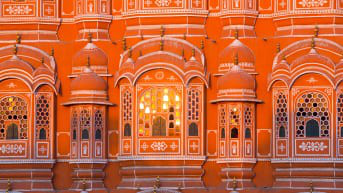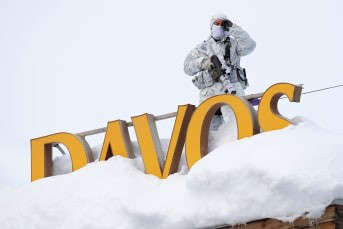Last Updated:2019-02-04
Last week two major events on the calendar of global gatherings kicked off the new year. They could not have been further apart.
Some 20,000 attendees, mainly middle-aged and older, made their way up the snow- blanketed steep valleys of far eastern Switzerland to the World Economic Forum's annual gathering of the global business and political elites.
Some 50,000 paid to attend the Jaipur Literature Festival (JLF) in India's largely desert Rajasthan State and 80 per cent of the participants were under the age of 30.

Jaipur is an old city filled with youthful ideas. Prisma by Dukas Presseagentur GmbH / Alamy Stock Photo
Both gatherings dealt with the big global issues of our times – environment, geopolitical realignment, gender, migration, inequality, autocracy, terrorism, technology and science.
Davos, as usual, looked at these issues from the perspective of how they affect business and the economy.
Advertisement
JLF looked at them through literature, history and memoir as part of the human condition. It was asking how do individuals, past, present and in the fictional future imagine and understand these things and cope both as individuals and societies.
The Davos meeting has been reported as something of a disappointment, with the failure of many of the big drawcard political heavyweights such as Trump, May, Macron, Putin and Xi not turning up.
JLF, by contrast, was celebrating its inclusiveness: record attendance and so many young people, who will be living in this world long after much of the Davos crowd has departed.
JLF started 12 years ago. Reflecting India's history – which so powerfully shapes its present – of rich, old and still venerated traditions, deeply woven together with British imperialism.
JLF was, in the now old and hackneyed phrase, born global. It's founding members were a group of local Indian and British writers and some astute business people.
A commercial enterprise, Teamwork, not only runs the annual JLF but has franchised it out to several other English-speaking countries, including Australia where it is held in Adelaide.
Germaine Greer has been a standout contributor this year in her typical iconoclastic way.
Warm and fun
In sharp contrast to the global elitism of Davos dominated by "everywhere" people, JLF is democratic, open, and welcoming. In Davos security is oppressive and inconvenient especially in the snow and ice. JLF is warm and is fun.

In Davos security is oppressive and inconvenient especially in the snow and ice. JLF is warm and is fun. Gian Ehrenzeller
It might be precisely because JLF embraces democratic principles that India's neighbour, China, is almost entirely absent. In a cast of hundreds of speakers and panellists, there is just one Chinese participant and it is not clear if she is overseas Chinese or a mainlander.
Although it is easy to miss a few faces among 50,000, unlike everywhere else in the world, there seems to be few if any Chinese at the JLF.
With much of the rest of the world being in a state of existential anxiety over the rise of China, its absence is extraordinary. In part, this might reflect India's insouciance about China.
India is a big country too, also with a long and proud history and major cultural achievements and contributions to the world's heritage. It is also experiencing rapid economic growth.
Something else, however, is at play. A JLF is simply inconceivable in China. JLF is a celebration of free-thinking, of challenging the establishment, of placing faith in young people to think in new ways, to have values that transcend material consumption and to treasure art and culture. It is not that JLF does not welcome Chinese participation, but rather China does not welcome the JLF.
China could not host such an event. It is not just the narrow and ever-diminishing limits on expression, but it is that authentic expression is not tolerated, even if it stays away from criticising the Party-controlled system.
In conferences in China today, academics fill their speeches with references to the latest opinions of Xi Jinping that can cover everything from economics, world history, to art and architecture.
Chinese conferences today from the Boao Forum on Asia to Caixin and Caijing Conferences on business and economics, to the World Economic Forum's meetings in China, to hundreds of others, are cookie-cut boring non-events.
India will have a general election in May. Several sessions at the JLF discussed the upcoming election from different perspectives. Opposing politicians were on stage and the debates were not only lively, but intellectually stimulating and humorous.
These were reminiscent of what political discussion was once like in Australia before social media and the 24-hour news cycle took hold. And, again, young people, many too young to vote, had challenging questions for the professional politicians.
However the next great rivalry plays out, which will be between India and China, Davos and Davos Man (yes it was always a male) are already a thing of the past. Davos grew out of the grand European project of greater integration and supra-national government and globalisation.
Division within Europe, the rise of nationalist sentiment on both the right and the left have meant that Europe offers little to the young in the rest of the world. It will be increasingly consumed by its own internal concerns. Davos is now not worth the subscription fees.
It is something of a curiosity that the JLF may speak more to the future. It is not the elitist group of Davos, which has been rejected by so many countries in Europe and in Britain, and from the US, Philippines and Brazil, where in democratic elections old closed political establishments have been rejected one after the other.
It is also the antithesis of the authoritarian repressive model of China under the Chinese Communist Party. It is a lively conversation about the world and the human condition at both an individual level and that of society.
Geoff Raby is a former Australian ambassador to China.





